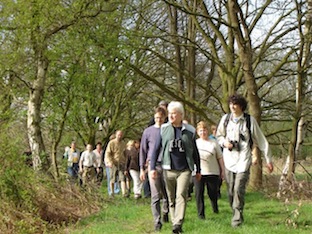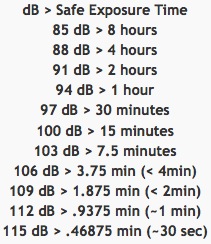
Laten we even filosoferen over het gebruik dat we maken van onze parken. Dat is in de eerste plaats recreatie, actief zijn door wandelen bijvoorbeeld, in een omgeving met zuiverder lucht dan in de stad, of het kan ook muziekevenementen inhouden. Beide soorten 'recreatie' zijn tegengesteld in hun effecten op onze gezondheid. Het eerste, wandelen vooral, is gunstig, het tweede is schadelijk. Daarbij komt nog dat de stad, zeker in Amsterdam, zeer vervuild is en dat parken een dringende noodzaak zijn voor het behoud van onze gezondheid. Luchtvervuiling bevordert geestelijke achteruitgang en hartkwalen. Om dat tegen te gaan heb je parken nodig, maar geen muziekevenementen die 110-115 dB ten gehore brengen twee dagen lang, en die ook nog eens veel vervuilend verkeer aantrekken.
TheEpochTimes: "A new research paper links a specific kind of pollution to faster rates of cognitive decline.
“The most important finding of our study is that women who were exposed to higher levels of ambient particulate matter over the long term experienced more decline in their cognitive scores over the four-year period that we followed them up.”
... tiny particulates in the air might be getting into the brain directly.
“Several studies have found that these particles—at least some of them—can actually get into the brain where they can cause inflammation and might even trigger some of those microscopic changes that are typical of Alzheimer’s Disease.”
Numerous studies have identified an association between air pollution and cardiovascular disease, and the cognitive decline may be a result of damage to the blood supply.
For example, research published in the same journal as Weuve’s paper, the Archives of Internal Medicine, found a higher risk of stroke on days when there were more particulates in the air. The fine particles were mainly from vehicle exhausts.
And a new study in the journal of the American Medical Association, JAMA, combined results of 34 studies and found a statistically significant association between heart attack risk and a wide range of air pollutants, excepting ozone."
GGDBZO: "Onder jongeren wordt nog te vaak nonchalant om gegaan met het feit dat harde geluiden gehoorschade kunnen veroorzaken. Dat geldt ook voor mensen die werken in de muziek of in de geluidstechniek. Toch lopen in Nederland elk jaar 22.000 jongeren blijvende gehoorschade op. Afhankelijk van de aard van de schade kan dat leiden tot depressies en zelfs gedragsverandering. Gehoorschade wordt nog steeds erg onderschat."

Bovenstaande tabel geeft aan wat een veilige tijdslimiet is voor diverse geluidsniveaus. 85 dB kun je 8 uur aanhoren, maar 115 dB maar ongeveer 30 seconden. Dat maakt een muziekevenement per definitie een schadelijk event.
Als we nu even recreatief wandelen onder de loep nemen, dan zien we dat wetenschappelijke studies aantonen dat wandelen een gunstig effect heeft voor het behoud van onze lichamelijke en geestelijke gezondheid tot op late leeftijd. Niet voor niets worden bejaardentehuizen gebouwd in groene gebieden met veel wandelmogelijkheden.
TheEpochTimes: "Walking may be able to prevent your brain from shrinking and help preserve your memory, a new study published online on Wednesday in the medical journal Neurology suggests.
The study found that people who walked six to nine miles a week had more gray matter, or nervous tissue, in the brains compared to people who walked less than six miles a week. Research also showed that participants who walked the most have half the risk of developing dementia or Alzheimer’s disease.
Neurology: "Greater PA [physical activity] predicted greater volumes of frontal, occipital, entorhinal, and hippocampal regions 9 years later. Walking 72 blocks was necessary to detect increased gray matter volume but walking more than 72 blocks did not spare additional volume. Greater gray matter volume with PA reduced the risk for cognitive impairment 2-fold.
Conclusion: Greater amounts of walking are associated with greater gray matter volume, which is in turn associated with a reduced risk of cognitive impairment."
Het mankeert het bestuurscollege van Zuidoost aan gezond verstand als ze meer muziekevenementen plannen in het Gaasperpark, een gebrek dat mogelijk is veroorzaakt door niet of te weinig te wandelen in ons mooie park.

